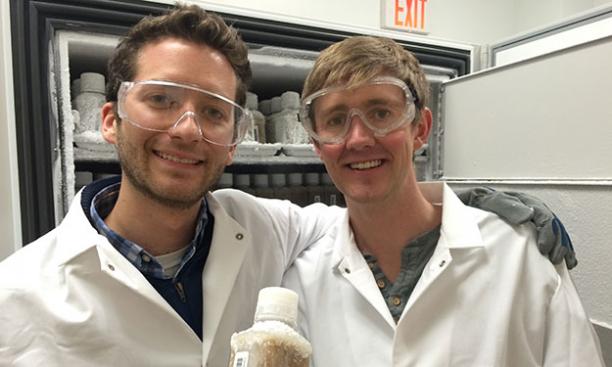
Clostridium difficile colitis, commonly known as C. diff, infects some 500,000 people per year in the United States, with sometimes deadly effects, according to the American Gastroenterological Association. But Mark Smith ’09 and James Burgess ’09 have a safe and effective solution to fight the intestinal bug — and it uses material that normally gets flushed down the toilet.
Smith and Burgess are cofounders of OpenBiome, a nonprofit organization in Massachusetts that provides stool samples used in a procedure called fecal microbiota transplantation (FMT), which introduces microbes from healthy stool to fight C. diff. If you think it sounds a little weird, you’re not alone. Smith, a microbiologist, said he had the same reaction when he first heard about FMT.
As a graduate student at MIT, Smith studied the human microbiome, the collection of microbes that live in or on the human body. After reading about FMT and its effectiveness, he asked Burgess if there might be a business opportunity for a stool bank, to provide the specimens needed for the transplant. But with the procedure’s intellectual property largely in the public domain, Burgess did not see much potential for profit.
The idea remained dormant until a friend’s relative contracted a persistent C. diff infection and struggled to find a medical facility that would provide the FMT treatment. (He eventually received a successful fecal transplant, after a year and a half of recurring infections.)
Smith and Burgess returned to their plans and decided to try launching a nonprofit. They researched the relevant regulations and developed protocols for screening donors and processing samples.
At the time, Smith was finishing his Ph.D., and Burgess was beginning an MBA program. OpenBiome had no real marketing — Smith and Burgess had reached out to doctors, but largely, they were relying on word of mouth. They figured they could manage OpenBiome as a part-time venture. But the organization quickly grew into a fulltime commitment.
According to Karl Yoder ’09, the director of clinical outreach, OpenBiome has been expanding at a rate of 10 to 20 percent per month since November 2013. More than 2,200 patients at hospitals around the country have received the frozen fecal transplant materials, with promising clinical results. Princetonians have played a leading role in OpenBiome’s growth. In addition to Smith, Burgess, and Yoder, the OpenBiome team includes Carolyn Edelstein ’10 *14 and Deberly Kauffman ’14.
Headlines about FMT invariably refer to the treatment’s source material (“The Excrement Experiment,” in The New Yorker; “When Feces is the Best Medicine,” in The Atlantic), and OpenBiome is not above a few potty references. The stool-donation page on its website includes a helpful chart to show the correlation between the “size of poop” and the number of people that can be treated using the sample.
But there’s a serious, two-part mission behind the stool bank, Burgess said: OpenBiome aims to catalyze more research into the human microbiome — studies to date are just the “tip of the iceberg,” he said — while at the same time fulfilling its goal of expanding access to fecal transplants. “We absolutely want to make sure anybody that needs and is a good candidate for an FMT has that opportunity,” he said.
